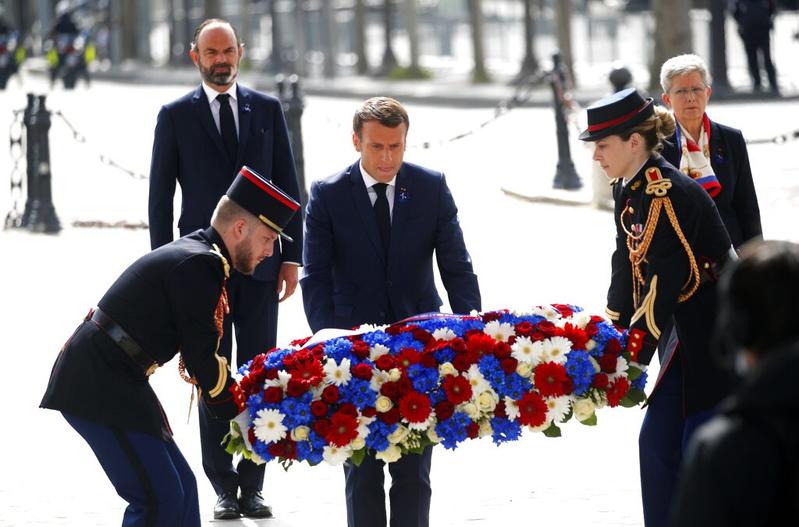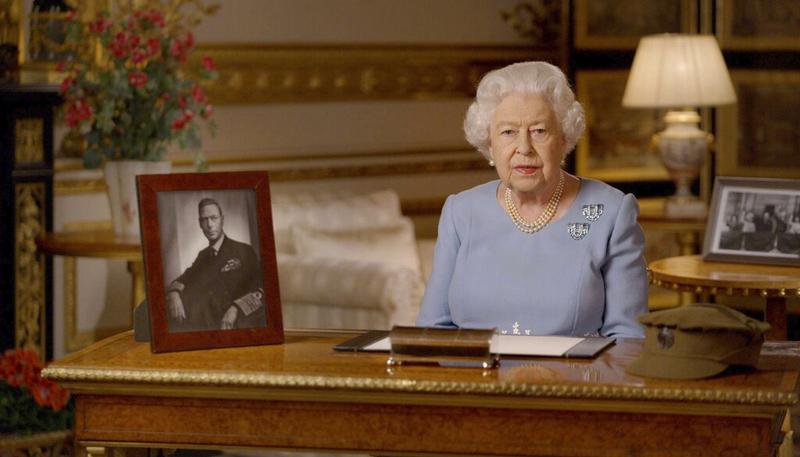
French President Emmanuel Macron lays a wreath of flowers during a ceremony to mark the 75th anniversary of the World War II victory over Nazi Germany, at the Arc de Triomphe in Paris, May 8, 2020. (CHARLES PLATIAU / POOL VIA AP)
BERLIN/MOSCOW/LONDON-Europe marked 75 years since the end of World War II in a somber mood on Friday as the coronavirus pandemic forced the cancellation of elaborate ceremonies.
Large-scale parades that had been envisaged to commemorate victory over the Nazis have been downsized as the world grapples with a fearsome new enemy that has killed 277,000 people and sickened more than 3.7 million.
Street parties this year were banned in Britain. In France, President Emmanuel Macron laid a wreath at the Arc de Triomphe monument at the top of a largely deserted Champs-Elysees Avenue since the country is still under a strict lockdown until Monday.
German Chancellor Angela Merkel joined President Frank-Walter Steinmeier in laying wreaths at Neue Wache - Germany's main memorial to the victims of war.
"The coronavirus pandemic is forcing us to commemorate alone - apart from those who are important to us and to whom we are grateful," Steinmeier said.
READ MORE: Historical photos: Nazis surrender, ending World War II in Europe
He urged Germans to "think, feel and act as Europeans" amid the coronavirus crisis.
Likewise, large parades across Europe were scrapped, drastically downsized or moved online, as the continent grapples with its biggest crisis since World War II.
With veterans already at an advanced age, organizers of marches had deemed it too risky for them to attend events even in countries which have begun to ease lockdown measures
With veterans already at an advanced age, organizers of marches had deemed it too risky for them to attend events even in countries which have begun to ease lockdown measures.
Russia had originally planned a huge military display on its May 9 Victory Day, with world leaders including Macron on the guest list.
Flypast
But now only a flypast took place over Moscow's Red Square on Saturday, as the country becomes Europe's new hotspot of infections.
Russian President Vladimir Putin, clad in black, laid a ouquet of red roses at the Eternal Flame war memorial outside the Kremlin walls after a brief downpour in the Russian capital.
"We will certainly celebrate this anniversary extensively and solemnly, as usual," Putin said, pledging that Russia would hold its traditional Red Square military parade and commemorative processions at a later date.
On Friday, Putin sent telegrams to US President Donald Trump and British Prime Minister Boris Johnson, suggesting the need to rekindle their nations' cooperation during World War II to solve today's problems.
Putin's overture was the latest in a series of contacts with Washington with whom Moscow is keen to rebuild relations frayed over many issues.
Putin and Trump said they worked closely together to clinch a global oil production cuts deal and spoke by phone on Thursday when Trump offered to supply Russia with medical equipment to help fight the new coronavirus.
In the message to Trump, Putin said Russia and the United States now stood at the forefront of confronting global challenges.
"Our countries could do a lot to ensure international security and stability," he said.
Moscow's ties with London remain badly strained over the poisoning of a former Russian spy and his daughter in England.
Putin told Johnson the Allies' togetherness during World War II was needed today and that the memory of those years could help British-Russian ties improve.
The telegrams were among many Putin dispatched to the Soviet Union's World War II allies on the 75th anniversary of the end of the conflict in Europe.
 In this image taken from video and made available by Buckingham Palace, Britain's Queen Elizabeth II addresses the nation and the Commonwealth on the 75th anniversary of VE Day, from Windsor Castle in Windsor, England, May 8, 2020. (BUCKINGHAM PALACE VIA AP)
In this image taken from video and made available by Buckingham Palace, Britain's Queen Elizabeth II addresses the nation and the Commonwealth on the 75th anniversary of VE Day, from Windsor Castle in Windsor, England, May 8, 2020. (BUCKINGHAM PALACE VIA AP)
'Our streets are not empty'
In Britain, massive celebrations, as well as thousands of street parties, had to be scrapped due to the pandemic. A parade through London, which would have included a diminishing group of World War II veterans, was one of the events called off.
Extracts of a moving VE Day speech made by wartime prime minister Winston Churchill, saying people could enjoy a brief period of rejoicing, were broadcast during the day
But a mixture of social distancing and virtual gatherings enabled millions of people to ensure coronavirus did not put a dampener on commemorating the anniversary.
Many communities flew flags with colorful bunting decorating their streets, holding safe-distance street parties with neighbors.
A day of poignant and happy events ended Friday night when Britain's Queen Elizabeth II made an address to the nation from Windsor Castle where she and her husband Prince Philip, the Duke of Edinburgh, are in lockdown.
In his message, the monarch said: "Today it may seem hard that we cannot mark this special anniversary as we would wish. Instead we remember from our homes and our doorsteps. But our streets are not empty; they are filled with the love and the care that we have for each other.
"And when I look at our country today, and see what we are willing to do to protect and support one another, I say with pride that we are still a nation those brave soldiers, sailors and airmen would recognize and admire."
Earlier the monarch's heir and eldest son, Prince Charles and his wife the Duchess of Cornwall, led a two-minute silence in a tribute to those killed and injured when war swept across the European continent in the 1940s.
A gun salute from Edinburgh Castle marked the start and end of the silence.
Later the heir to the British throne read extracts from the diary of his grandfather, King George VI, relating the wartime monarch's experiences of VE Day in 1945.
The diary described the King's relief that the war in Europe was over, with references to the Royal family's iconic appearances on the Buckingham Palace balcony, cheered by tens of thousands of people.
Extracts of a moving VE Day speech made by wartime prime minister Winston Churchill, saying people could enjoy a brief period of rejoicing, were broadcast during the day.
No hate speech
On the anniversary of Nazi Germany's surrender to Allied forces in Europe in 1945, United Nations Secretary-General Antonio Guterres warned that the pandemic is unleashing "a tsunami of hate and xenophobia, scapegoating and scare-mongering". He appealed for "an all-out effort to end hate speech globally".
The UN chief warned that "anti-foreigner sentiment has surged online and in the streets, anti-Semitic conspiracy theories have spread and COVID-19-related anti-Muslim attacks have occurred".


